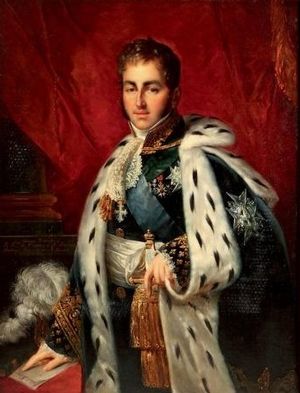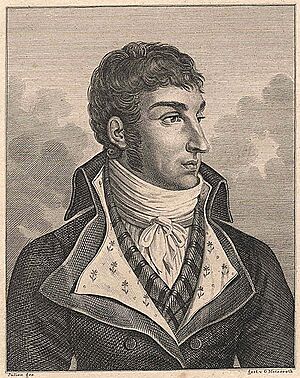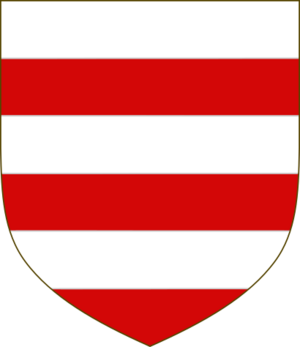Jules de Polignac facts for kids
Quick facts for kids
Jules de Polignac
GCOSL, OLH, KOHS, KOSML
|
|
|---|---|
 |
|
| Prime Minister of France | |
| In office 8 August 1829 – 29 July 1830 |
|
| Monarch | Charles X |
| Preceded by | Jean-Baptiste de Martignac |
| Succeeded by | Jacques Laffitte |
| French Ambassador to the United Kingdom | |
| In office 28 December 1822 – 4 January 1828 |
|
| Appointed by | Jean-Baptiste de Villèle |
| Preceded by | François-René de Chateaubriand |
| Succeeded by | Pierre de Montmorency-Laval |
| Personal details | |
| Born | 14 May 1780 Versailles, Île-de-France, Kingdom of France |
| Died | 2 March 1847 (aged 66) Saint-Germain-en-Laye, Yvelines, France |
| Resting place | Picpus Cemetery |
| Political party | Ultra-royalist |
| Spouses |
Barbara Campbell
(m. 1816; her d. 1819)Charlotte Parkyns de Choiseul
(m. 1824; annulled 1832) |
| Children | Armand Seyna-Camille Alphonse Ludovic Yolande Camille Edmond |
| Parents | Jules, 1st Duke of Polignac Gabrielle de Polastron |
| Signature | |
Jules de Polignac (born May 14, 1780, died March 30, 1847) was an important French politician. He was known for being an "ultra-royalist," meaning he strongly supported the king and traditional ways of ruling. Jules de Polignac served as the Prime Minister of France under King Charles X. This was just before the July Revolution in 1830, which led to the king being overthrown.
Contents
Early Life and Family
Jules de Polignac was born in Versailles, France. His mother, Gabrielle de Polastron, was a close friend of Queen Marie-Antoinette. Because of his mother's special position, Jules grew up in the royal court at Versailles. His family had many luxurious rooms there.
When the French Revolution began in 1789, Jules's mother and her friends had to leave France because their lives were in danger. She was a strong supporter of the king's absolute power. Jules inherited these strong beliefs from his mother, who passed away in 1793.
Family Life and Children
Jules de Polignac was married two times. His first wife was Barbara Campbell, a young woman from Scotland. They married in London in 1816 and had two children:
- Armand (1817–1890)
- Seyna-Camille (1818–1833)
After Barbara passed away in 1819, Jules married Charlotte Parkyns in London in 1824. She was the daughter of Lord Rancliffe. Jules met her while he was working as the French Ambassador in London. They had five children together:
- Alphonse (1826–1863)
- Ludovic (1827–1904)
- Yolande (1830–1855)
- Camille (1832–1913)
- Edmond (1834–1901)
Some of their children were born while Jules was in prison later in his life. Even though their marriage was later cancelled by a French court, Jules and Charlotte renewed their vows in England.
Political Career and Challenges
When Jules de Polignac returned to France, Napoleon Bonaparte was in power. Jules remained very loyal to the royal family who had been forced to leave France. In 1804, he was involved in a plot against Napoleon and was put in prison until 1813.
After the royal family (the Bourbons) returned to power, Jules was given many honors and important jobs. In 1820, the Pope gave him the title of "Prince." In 1823, King Louis XVIII made him the ambassador to Great Britain. A year later, King Charles X became king. Polignac continued to be a very strong supporter of the king and traditional rule.
On August 8, 1829, King Charles X made Jules de Polignac the minister of foreign affairs. In November, he became the president of the council, which meant he was the most powerful politician in France. Many people thought his appointment was a step towards changing the country's laws and constitution.
Polignac and other ministers were responsible for creating the "Four Ordinances" in July 1830. These new laws were very unpopular and directly led to the July Revolution.
After the Revolution
When the revolution began, Jules de Polignac tried to escape. He was eventually arrested in Granville. During his trial, he was sentenced to prison for life at a castle in Ham. However, he was released in 1836 as part of an amnesty, and his sentence was changed to exile. While in prison, he wrote a book called Considerations politiques (Political Thoughts).
After his release, he lived in England for several years. He was later allowed to return to France, but he was not allowed to live in Paris.
Jules de Polignac passed away in Saint-Germain in 1847. His death was caused by the effects of his time in prison. About a month before he died, he became the Duke of Polignac after his older brother passed away without children.
Historical Note on Slave Ownership
Historical records show that Jules de Polignac received a payment related to slave ownership after the Slavery Abolition Act 1833 in Britain. This act ended slavery in most British territories. He was connected to three claims and received a payment for 628 enslaved people in Saint Vincent and the Grenadines. Even though he was French, he had connections in the British Empire because his first wife was Scottish.
See also
 In Spanish: Jules de Polignac para niños
In Spanish: Jules de Polignac para niños
- List of Ambassadors of France to the United Kingdom
Images for kids
 | Misty Copeland |
 | Raven Wilkinson |
 | Debra Austin |
 | Aesha Ash |



